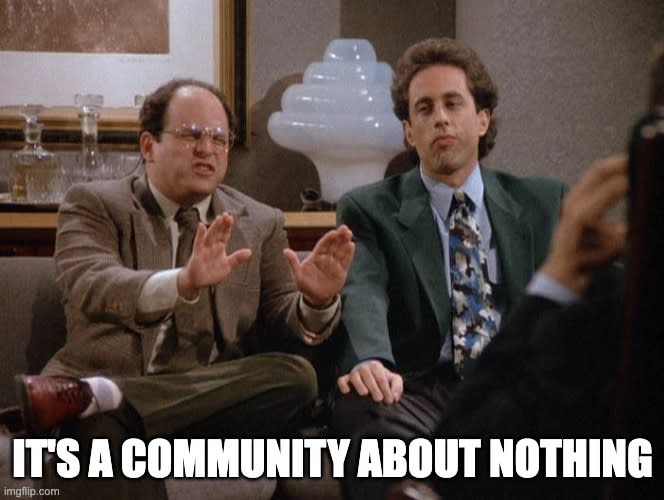Against Doing Things
By Benny Smith @ 2025-04-01T17:00 (+79)
Epistemic status: 0%
Much ink has been spilled on this forum investigating what we should do about the world's most pressing problems. However, I've recently come to the realization that doing nothing may be even more promising than the most cost-effective EA interventions!
Below is a shallow writeup of the top reasons why you should stop doing things.
- The Singularity is Near. Soon AI will do all the things, so why bother?
- The Unilateralist's Curse. It was foretold that if you do things unilaterally, you will be cursed.
- Cluelessness. EA thought leaders are still clueless about what to do despite years of research!
- Markets are efficient. The thing you would have done is already priced in.
- Doing things is not your comparative advantage. Someone else would do it better.
- Lack of evidence. Despite years of people doing things, there is still a striking paucity of high-quality RCTs comparing Doing Something with the alternative.
- Worldview diversification. Maximizing impact requires that we commit meaningful resources to a variety of approaches. Zero EA charities do nothing, despite many arguments in favor of it. Doing nothing is neglected within EA.
- The universe is infinite. Nick Bostrom has proven that this undermines utilitarianism, which means everything you do is pointless.
- Eliezer Yudkowsky has disproven free will. This means you actually can't do things, even if you wanted to.
- Doing things causes inequality. If you do something and other people do NOT do that thing, this causes inequality in things-being-done. Inequality is bad. The best distribution is the one where we all equally do nothing.
Announcing Doing Nothing Better
My new nonprofit, Doing Nothing Better, will include both a think tank and a career advisory focused on discouraging agency and problem-solving in promising students and young professionals.
Not convinced this is a promising route to impact? Worried that it could do active harm? Don't worry! We won't actually do anything. :)
Manuel Allgaier @ 2025-04-02T12:31 (+10)
Consider that, in addition to doing nothing yourself, you can also discourage others from doing anything.
Write a nit-picky critique, say something vague like "I don't you should do this" without any further explanation, defer to authority.
We need to ensure that no-one does anything if they're not at least 98% confident that they're the world's most qualified person to do the thing.
tcheasdfjkl @ 2025-04-02T20:16 (+7)
me: [reads this comment to my housemate, after showing him the post]
housemate: I don't know, that sounds like doing things to me. they are literally recommending a course of action!
me: you should go say that in the comment thread!
housemate: ....meh.
(clearly my housemate has better internalized the lessons of this post than I)
Benny Smith @ 2025-04-02T12:43 (+1)
Very true. Nit-picking and deference to authority are highly neglected cause areas in themselves. Imposter syndrome is underrated
Manuel Allgaier @ 2025-04-02T12:26 (+10)
I think you made a mistake here, let me correct:
> Doing things is not your comparative advantage. Someone else would could do it better.
It doesn't matter if none of the better suited people are actually doing it, just the fact that they could do a better job is sufficient to sit back and relax. If you want to do more, you could write a forum post arguing that 'someone should do this' and let the universe take care of the rest.
Benny Smith @ 2025-04-02T12:43 (+3)
That's a great point, thanks Manuel!
Ben_West🔸 @ 2025-04-02T00:47 (+9)

Ben Millwood🔸 @ 2025-04-01T18:24 (+3)
forgive the self-promotion but here's a related Facebook post I made:
The law of conservation of expected evidence, E(E(X|Y)) = E(X), essentially states that you can't "expect to change your mind", in the sense that, if you already thought that your estimate of (say) some intervention's cost-effectiveness would go up by an average of Z after reading this study, then your EV should already have been Z higher before you read it. You should be balanced (in EV terms) between the possible outcomes that would be positive surprises and negative surprises, otherwise you're just not calculating your EVs correctly.
Anyway, let's take X to be global future welfare, and Y to be the consequences of some action you take. E(E(X|Y)) = E(X) means that the average global well-being given the outcome of your action is exactly the same as the average global well-being without the outcome of your action. So why did you bother doing it?
Benny Smith @ 2025-04-02T12:50 (+1)
Great point!
In addition to not doing anything, we should also stop thinking.
Camille @ 2025-04-01T17:17 (+3)
As someone who sometimes hesitates way too much, this is unironically helpful x)